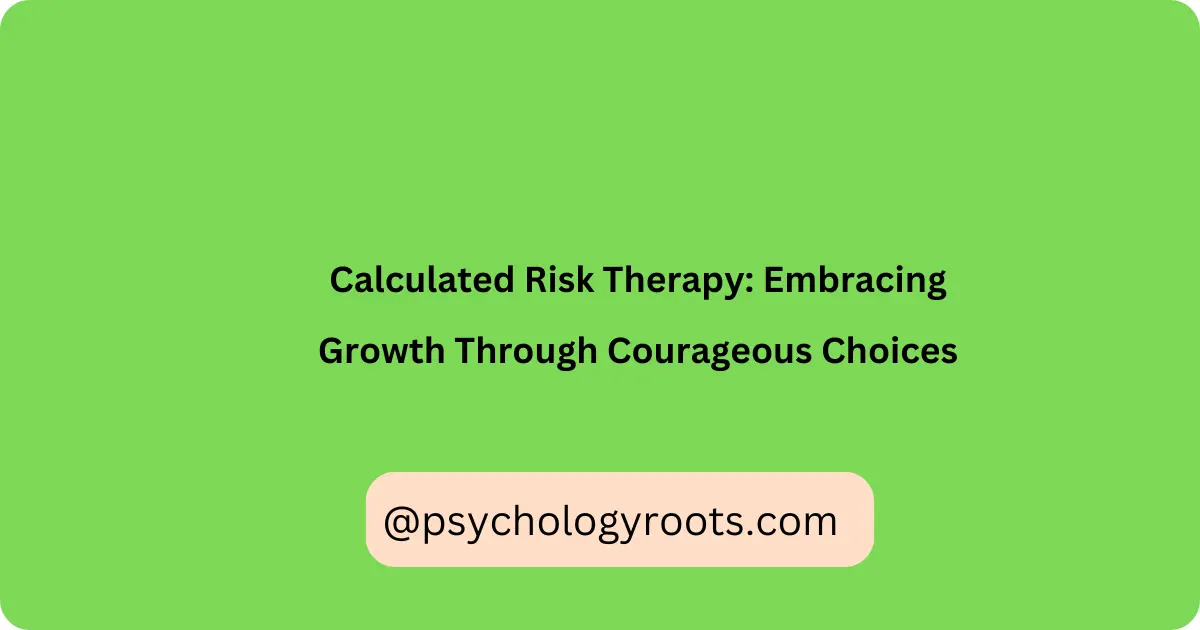Table of Contents
Calculated Risk Therapy: Embracing Growth Through Courageous Choices
Taking risks is an inherent part of life, yet many of us hesitate to step into the unknown due to fear of failure, rejection, or uncertainty. Calculated risk therapy offers a structured approach to overcoming these fears by encouraging intentional, thoughtful risk-taking that fosters personal growth and stronger relationships. By embracing calculated risks, we can break free from self-imposed limitations, build resilience, and create deeper connections with others.
This blog explores the concept of calculated risk therapy, its psychological benefits, and practical strategies to integrate risk-taking into your life.
Understanding Calculated Risk Therapy
Calculated risk therapy is not about reckless decision-making but intentional actions that involve stepping out of your comfort zone while weighing potential outcomes. It’s a process of identifying opportunities for growth, assessing risks, and taking meaningful actions despite uncertainties.

The Psychology Behind Risk-Taking
Identity Formation: Taking risks helps define who we are, reinforcing our sense of self.
Building Resilience: Facing challenges strengthens our ability to adapt and recover from setbacks.
Fostering Intimacy: Risks in relationships, such as vulnerability, pave the way for deeper emotional connections.
The Safety in Risk-Taking
How Risk-Taking Builds Self-Esteem
Taking calculated risks protects our sense of identity and builds confidence. When we confront fears and uncertainties, we prove to ourselves that we are capable of more than we initially believed.
For instance, speaking up in a meeting despite the fear of being judged demonstrates courage and reinforces self-worth. These small victories accumulate over time, boosting self-esteem and encouraging further growth.
Enhancing Relationship Closeness
The willingness to take emotional risks, such as sharing vulnerabilities or expressing feelings, is essential for fostering intimacy in relationships. By risking wisely, we embrace fears that often restrict us, creating opportunities for authentic connections.
The Role of Calculated Risk in Personal Growth
Calculated Risk as a Character Builder
Taking thoughtful risks is akin to a barbell for strengthening character. Each risk builds emotional muscles, helping us navigate life’s uncertainties with greater ease.
For example, applying for a job despite not meeting every qualification may feel daunting, but the process itself fosters resilience, confidence, and a proactive mindset.
Embracing Fear Without Being Reckless
Calculated risk therapy emphasizes embracing fear without succumbing to recklessness. It’s about understanding the fine line between healthy challenges and unnecessary dangers.
Strategies for Embracing Calculated Risks
- Start Small: Begin with manageable risks that push your boundaries slightly. For instance, strike up a conversation with a colleague you’ve never spoken to before.
- Assess Potential Outcomes: Evaluate the possible positive and negative consequences of a decision. This reflection ensures your actions are intentional and aligned with your goals.
- Embrace the Process, Not Just the Outcome: Focus on the growth and learning that occur during the process of taking a risk, rather than fixating solely on the result.
- Build a Support System: Surround yourself with people who encourage and support your risk-taking endeavors. Their perspective can help you navigate uncertainties more effectively.
- Practice Self-Compassion: Be kind to yourself if a risk doesn’t yield the desired outcome. Every step outside your comfort zone is a step toward growth.
How Calculated Risk Therapy Enhances Relationships
- Deepening Emotional Intimacy: Taking the right risks in relationships, such as expressing vulnerability or setting boundaries, fosters trust and mutual understanding. This enhances the quality of intimacy and strengthens relational bonds.
- Resolving Conflicts Through Courage: Approaching conflicts with a willingness to address uncomfortable truths requires calculated risk. This bravery often leads to healthier and more constructive resolutions.
Frequently Asked Questions (FAQs)
What is calculated risk therapy?
It’s a therapeutic approach encouraging intentional, thoughtful risk-taking to promote personal growth and stronger relationships.
How does risk-taking improve self-esteem?
Conquering fears and uncertainties boosts confidence and reinforces a sense of self-worth.
Can calculated risks help in relationships?
Yes, emotional risks like vulnerability and open communication foster intimacy and trust.
What if I fail at a risk I take?
Failure is part of growth. Reflect on the experience, learn from it, and use it to inform future decisions.
Is calculated risk therapy suitable for everyone?
While generally beneficial, it’s essential to tailor risks to individual comfort levels and circumstances.
References
- Brown, B. (2012). Daring Greatly: How the Courage to Be Vulnerable Transforms the Way We Live, Love, Parent, and Lead. Gotham Books.
- Neff, K. D. (2011). Self-Compassion: The Proven Power of Being Kind to Yourself. William Morrow.
- Kahneman, D. (2011). Thinking, Fast and Slow. Farrar, Straus and Giroux.
- Plutchik, R. (2003). Emotions and Life: Perspectives from Psychology, Biology, and Evolution. American Psychological Association.
Help Us Improve This Article
Have you discovered an inaccuracy? We put out great effort to give accurate and scientifically trustworthy information to our readers. Please notify us if you discover any typographical or grammatical errors.
Make a comment. We acknowledge and appreciate your efforts.
Share With Us
If you have any scale or any material related to psychology kindly share it with us at psychologyroots@gmail.com. We help others on behalf of you.